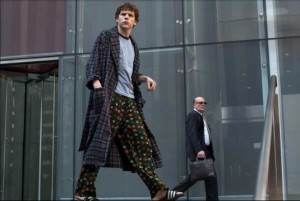some thoughts on The Social Network
The Social Network is as good as everyone says it is.
When the first reviews appeared, I was baffled and a little concerned. I’m a big fan of David Fincher’s work, but the first three reviews I read compared the movie, favorably, to, in this order, Rashomon, The Godfather, and Citizen Kane.
Which, you will admit, is a pretty high set of bars to clear.
Now then, as it happens, The Social Network does, indeed, compare favorably to Rashomon, The Godfather and Citizen Kane, but probably not in the ways you think.
Like Rashomon, it succeeds in telling, and telling well, a story from three different points of view. And those three points of view are presented fairly, evenly and without rancor or bias. As in any well-presented drama, no one is wrong and no one is right — there are only characters whose desires conflict.
Like The Godfather and Citizen Kane, it is a drama about power and wealth in America, and the effect it has on people caught up in it. Like The Godfather, its style is restrained, classic and understated — there is very little of Fincher’s bravura technique on display. Like the Coen Brothers, Fincher is developing into a handsomely understated director who no longer feels the need to draw attention to his camera placement and editing tricks. Which is another way of saying that, stylistically, it’s not very much like Citizen Kane, so if you’re expecting a mind-blowing visual experience full of startling perspectives, jarring juxtapositions and fancy photographic effects, you may be disappointed.
(That said, there are some stunning visual effects that do absolutely nothing to call attention to themselves.)
Like The Godfather, it is a penetrating drama that reveals something of a secret history, a force that affects everyone but no one really knows anything about. The lives of geeks and the lives of gangsters couldn’t be more different, but The Social Network finds the common ground between both. The key line in The Godfather Part II is “We’re bigger than US Steel,” and part of the drama of The Social Network is revealing the lives of the people who are having such an impact on our present society.
Which brings me to the complaints that I’ve read online about the movie. (Ha! I said “I’ve read online” as though I receive information from any other source.) The people who don’t like the movie seem to fall into two related camps: there are people who feel that the movie “gets it wrong,” that that’s simply not what happened, and people who feel that the movie is invalid because it’s “old media” criticizing “new media,” presenting America’s online society as a bunch of shallow, idiotic twerps (and, by extension, the audiences of an intelligently-made movie as sophisticated, discerning and mature). To the first, I say “Who cares?” but to the second I say “What the hell are you talking about?” Because the movie simply doesn’t do any of those things. Rather, it presents, like The Godfather, and like Mad Men for that matter, a handful of individuals caught at a moment in history, reacting to and trying to keep up with a society that is going to either make them or destroy them as they try, in vain, to control the change they begin.
